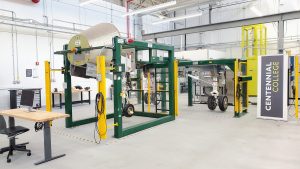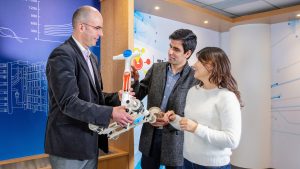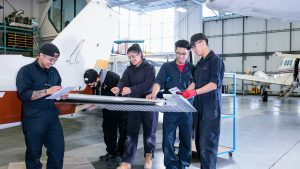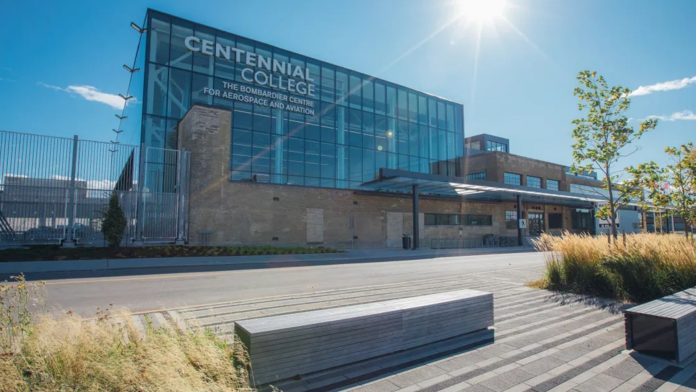With over 50 years of leading in aerospace and aviation training and research, Centennial College looks forward to partnering on impactful, sustainable innovation through Horizon Europe.
In the heart of Ontario, Canada, Centennial College takes aerospace innovation to new heights through its world-class training and research, as well as strong collaborations with academic, industry and community partners. With a longstanding history of excellence in aerospace and aviation, Centennial College invites academic institutions and innovation-driven companies across the globe to partner with us on leading-edge aerospace research and development projects.
Ontario, Canada: A global hub for aerospace R&D
Canada is a global leader in the aerospace industry, contributing $28.9bn to the nation’s GDP and over 218,000 jobs to the Canadian economy in 2023 – an increase of $1.7bn to GDP and 5,400 jobs from 2022. Nationwide, the aerospace industry is consistently ranked number one for research and development (R&D) among all Canadian manufacturing industries, with 3.6 times greater R&D intensity than the average in 2023.
Ontario is a vibrant hub of aerospace activity with a rich industrial heritage, hosting over half of the world’s top 25 aerospace companies’ operations – including Bombardier, Airbus, Pratt & Whitney Canada, and Safran Landing Systems. With over $2.66bn in exports of aerospace products across the province, Ontario is the home base for over 200 aerospace firms and employs over 46,500 people. Aerospace parts made in Ontario are used on virtually every passenger aircraft in the world, with the province accounting for around 30% of all aerospace activity in Canada.
Centennial College’s rich legacy in aerospace and aviation
Centennial has been a leader in aerospace and aviation for more than 50 years, with dedicated programmes for aerospace and aviation including aircraft manufacturing, maintenance and repair, engineering, management and more. As the largest provider of transportation repair and maintenance training in all of Canada, Centennial College delivers eight specialised programmes in aerospace and aviation and equips over 950 students annually with the knowledge, skills and experience to thrive in the industry upon graduation.

In 2019, the College opened the Bombardier Centre for Aerospace and Aviation – a $72m new aerospace campus in Toronto’s Downsview Park that revitalised the historic De Havilland Aircraft of Canada manufacturing site – bringing 138,000 ft² of aviation labs and spaces to train future aircraft maintenance engineers. The state-of-the-art facility features advanced laboratories, simulation rooms, and dedicated spaces for prototyping and testing, all designed to foster an atmosphere of creativity, experimentation and innovation.
From the beginning, the campus was designed to be both a training and a research hub. Two aircraft hangars totalling about 27,000 ft² house a full range of aircraft as well as disassembled subsystems. Within the collection is a fully functional Bombardier CRJ-200 Regional Jet and the latest Bombardier Global 7500 business aircraft – the world’s largest and longest-range business jet with the industry’s most advanced avionics and airframe features, including high-performance wings. The campus also has an exterior compound with aircraft refuelling and engine run-up capabilities, as well as a comprehensive suite of laboratories that students and researchers have access to, including Computer Numerical Control (CNC) Labs, Material Testing Lab, Composites Manufacturing Lab, Drone and Robotics Lab, Composites Manufacturing Lab, Avionics Labs, Electrical Labs, Turbine and Piston Engine Labs, and more.
The Landing Gear Innovation Lab
To complement the new aerospace campus and further increase Centennial’s aerospace research capacity, the Landing Gear Innovation Laboratory (LGIL) was constructed and opened in 2020, bringing 6,500 ft² of additional, dedicated aerospace applied research space. Supported by $2m in public funding, the LGIL was developed in collaboration with key industry partner Safran Landing Systems – a world-renowned landing gear manufacturer – to investigate next-generation landing gear technologies, especially landing gear electrification.
This high-ceiling lab is equipped with an overhead crane system and Bombardier Challenger 300 and CRJ-200 test rigs powered by an aerospace-grade hydraulic power unit, which can be custom-configured to test landing gear actuation systems. The LGIL computer lab has full design and prototyping capabilities provided through over a dozen industry-standard design and modelling software. Researchers also have access to an environmental chamber system with aerospace-specific temperature and humidity ranges, as well as a linear actuator test rig, rotary actuator test rig, and drop test tower.
Since the LGIL’s opening in 2020, the lab has completed over 44 projects with 21 industry partners, engaging over 154 students and 24 faculty members. Projects at the LGIL span the design, modelling, testing and optimisation of various landing-gear-related technologies.

For example, the Centennial research team developed an advanced parametric modelling tool to simulate retractable landing gear in Bombardier’s new sustainable Ecojet, including a full-scale 3D model that met the EcoJet’s unique tricycle landing gear design requirements.
Additionally, in collaboration with Safran Landing Systems, Centennial student researchers developed and optimised the design of a linear thermal, wax-based actuator using phase change materials to replace traditional hydraulic mechanisms with a lightweight, responsive, and efficient electrical landing gear actuation system.
Centennial has also worked on various projects to test aircraft components, including a series of applied research projects with Marsh Brothers Aviation (MBA) to test their proprietary high-performance self-lubricating bushings for use on the Piper Aerostar aircraft, focusing on strength, chemical resistance, fluid compatibility and durability under extreme conditions. The Centennial research team developed a custom test rig to evaluate the friction, load-bearing capacity, and wear rate of various bushing configurations, providing MBA with valuable data to verify the bushings’ suitability for Aerostar’s landing gear.
Innovating with impact: Aerospace applied research
Centennial College ranks first in Canada for student engagement in applied research, offering more paid student researcher internships than any other college in the country. Centennial Innovates – the college’s applied research, innovation and entrepreneurship department – leads the college’s applied research activities with an emphasis on impactful and sustainable innovation, each project mapped to the United Nations’ Sustainable Development Goals (SDGs). Centennial College’s innovation areas span eight diverse disciplines – aerospace, advanced manufacturing, digital healthcare, sustainable energy systems, transportation and low-carbon mobility, explainable data analytics, social innovation, and impact entrepreneurship.
Aerospace applied research makes up a major part of the college’s innovation portfolio. Since 2017, Centennial’s aerospace applied research programme trained 219 paid student researchers and supervised 30 highly qualified personnel working on over 53 aerospace industry-led research projects that support the design, development, prototyping, testing, validation and commercialisation of emerging technologies in aerospace.
Projects have encompassed diverse topics, including aircraft systems design and optimisation, parametric modelling software development, augmented and virtual reality (AR/VR) applications for aircraft maintenance training, testing of various aircraft components and consumables, drone path optimisation, analyses of manufacturing processes, and more.
Throughout the years, Centennial has fostered strong relationships with many innovators in aerospace – from industry leaders such as Bombardier, Safran Landing Systems, De Havilland Aircraft of Canada and Promation, to more local companies such as Marsh Brothers Aviation, a company that makes self-lubricating polymers for grease-free bushings, Aeroflux Braking Systems, a company developing aircraft magnetic brakes, and i5-O who is developing an AI-powered visioning platform.

Each year, the research value generated at Centennial College significantly exceeds its costs. On average, every $1 of research costs brings back $3.88 of cash in grants that go towards paying our student and faculty researchers, equipment, and training. In the 2024-25 Fiscal Year-To-Date, the college’s research value-to-cost ratio has reached the highest in recent years, at an average of 4.6 times the research costs.
Staying relevant: Aerospace MRO innovation
The aircraft maintenance, repair and overhaul (MRO) sector comprises 35% of Canada’s total aerospace employment, bringing an economic impact of $9.3bn in 2022 on Canadian GDP. Ontario accounts for 35% of Canadian MRO employment, with the majority clustered within the Greater Toronto Area (GTA).
With new-generation aircraft requiring a new suite of MRO technologies, equipment, facilities and skills to service, Centennial College is actively championing and facilitating MRO innovation support. Combining the existing innovation resources at Downsview Campus and the Landing Gear Innovation Lab, researchers can expect diverse and comprehensive research capabilities to catalyse the adoption of emerging technologies into the aerospace MRO sector, including specialisations in:
- Sensor technologies, such as the use of Internet-of-Things and Radio Frequency Identification in a 5G environment for aircraft assessment and inspection.
- Repair technologies, including the use of new materials and coatings such as nanomaterials adaptable for additive manufactured lightweight repairs on metallic and composite aircraft structures, robot-assisted repairs to increase repair efficiency and composite materials.
- Digitisation and data analytics, including the use of digital twins and augmented, virtual and mixed reality (AR/VR/MR) and artificial intelligence.
- Robotics and automation technologies, such as the use of drones for aircraft inspection and damage assessment or in-hangar component and tool delivery, automation to enhance data analysis and maintenance task delegation, and exoskeletons to improve workplace health, safety and productivity.
- Sustainable aviation technologies – a priority across international aerospace organisations – such as the use of sustainable aviation fuels (SAF) and all the supporting equipment, infrastructure, skillsets and maintenance procedures necessary to support the industry’s major sustainable technologies shift.
- Business process development and innovation, such as cybersecurity, encryption technologies, and lifecycle optimisation.

At its core, Centennial aims to leverage these emerging technologies to generate long-term economic, social and environmental benefits and to advance sustainable development within the aerospace industry and beyond.
Partner with us: A collaborative vision between Canada and Horizon Europe
With Canada having joined Pillar II of Horizon Europe, Centennial College actively invites partnerships with academic institutions, research organisations and innovation companies across the globe.
Academic and industry partners are welcome to leverage Centennial’s suite of cutting-edge facilities at the Downsview campus, the wealth of knowledge and expertise within its dozens of expert faculty members, and a pool of eager, innovation-minded, career-ready aerospace and aviation student researchers. For inquiries about potential collaborations, please contact us – we look forward to working with academic and industry partners throughout the EU and UK to create a brighter, more innovative future in aerospace!
Please note, this article will also appear in the 21st edition of our quarterly publication.






Excited to see Centennial College leading the way in aerospace innovation! Can’t wait to see how their partnership with Horizon Europe unfolds!